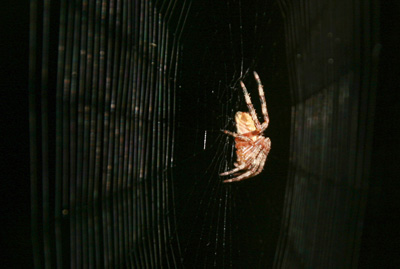We're open daily! View holiday hours
Science News
Web Help
July 10, 2013
by Molly Michelson

Shocking news? Perhaps… When capturing insects in their webs, spiders get a little help from electricity, according to a new study by UC Berkeley scientists.
Postdoc Victor Manuel Ortega-Jimenez, working in Berkeley’s Animal Flight Laboratory, usually studies hummingbird flight, but became interested in how spider webs attract insects while playing with his four year-old daughter. “I was playing with my daughter’s magic wand, a toy that produces an electrostatic charge, and I noticed that the positive charge attracted spider webs,” he says. “I then realized that if an insect is positively charged too, it could perhaps attract an oppositely charged spider web to affect the capture success of the spider web.”
As mentioned in our “Bee Positive” video, as insects fly through the air, they naturally become positively charged. Spider webs, on the other hand, are normally negatively or neutrally charged.
To test his spider web hypothesis, Ortega-Jimenez found cross-spider (Araneus diadematus) webs along streams in Berkeley and brought them into the lab. He then used an electrostatic generator to charge up dead insects—aphids, fruit flies, green-bottle flies and honeybees—and drop them into a neutral, grounded web.
“Using a high-speed camera, you can clearly see the spider web is deforming and touching the insect before it reaches the web,” he says. Insects without a charge did not do this. (Video is available here.)
Ortega-Jimenez also suspects that light, flexible spider silk, the kind used for making the spirals built on top of the stiffer silk that forms the spokes of a web, may have developed because it more easily deforms in the wind and the presence of electrostatic charges to aid prey capture.
“Electrostatic charges are everywhere, and we propose that this may have driven the evolution of specialized webs,” he says.
The findings were published last week in Scientific Reports.
Photo by Victor Manuel Ortega-Jimenez, UC Berkeley